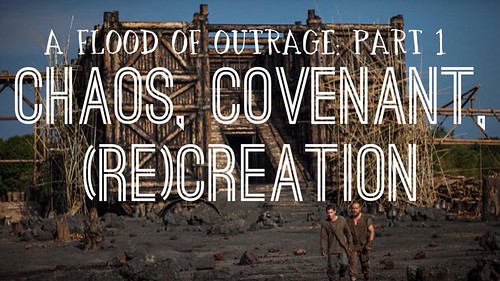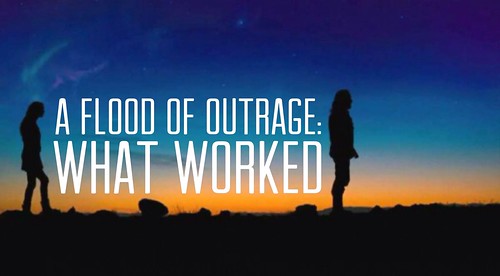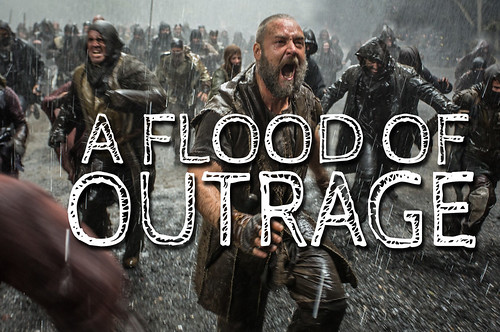
Welcome to Part One in our series looking at the movie Noah. Today the focus will be on the story of Noah as found in Genesis 6-9. As I argued in the introduction, there has been a lot of discussion about whether or not the movie Noah lives up to the theological narrative in Scripture and even more discussion about whether or not that even matters.
Last week, I saw a tweet that said, “All these Christians arguing that Noah isn’t theological enough… where’s their outrage about Capt America or Sabotage.”
2 Points on this line of thinking:
1) You’re right. As Christians we are called to a higher standard when it comes to the media and entertainment that we consume. I’m the guy who takes a notebook or I sit where I can open up Evernote on my phone in order to jot down thoughts or ideas I have during movies I go to. (Next Week: 10 leadership Lessons from Saving Mr Banks!) So yeah, as Christians we should be ready to “take captive every thought and make it obedient to Christ.” (2 Corinthians 10:5) We should engage with all media rather than passively allow it to wash over us unfiltered.
2) What a misguided comment. This is a huge false equivalency. Do not pass go. Do not collect $200. Conan the T-800’s action-drama about dirty DEA agents and Mexican cartels never claims to be a story rooted in Scripture. And while Cap finds finds himself caught up in a larger universe of mythology and storytelling, S.H.I.E.L.D. is a long way from the T.O.R.A.H. When a movie claims to be rooted in “research and biblical scholarship” you are inviting people to judge your film, not on your artistic interpretations, but on your “research and biblical scholarship.”
In Part 2, I am going to dive into some of the cinematic flourishes, inventive storytelling, and artistic licenses that the filmmakers gambled on that actually worked in this movie. It is completely understandable that in order to fill a 2 hour movie you might need to rely on elements that may not be found in a 3 chapter narrative with only one speaking part. It really isn’t fair to judge a movie completely by how literal it sticks to the source material. If that were true than we would have to critically reassess every movie from Disney fairy tales to Braveheart to The Ten Commandments to Son of God. Every one of these films, including those based on Scripture, contained something different, added, or artistically created in order to movie the story along.
So then, I’m not interested in arguing the merit of Noah based on it’s factual, literal accuracy. My concern is whether on not the film connects the audience to the overarching theological narrative we find in scripture, particularly how the story of Noah connects with redemption and the Gospel of Jesus Christ.
To show you what I’m talking about, read at what director Aronofsky said in an interview about his goal of adapting a story from the biblical source and bringing it to life on the big screen.
“I think it’s more interesting when you look at not just the biblical but the mythical that you get away from the arguments about history and accuracy and literalism. That’s a much weaker argument, and it’s a mistake.
Because when you think about Icarus, you don’t talk about the feathers and the wax and how the wax attached to his body and how is it physically possible that he could fly with feathers on his arms. No. You’re talking about how he flew too high and was filled with hubris and it destroyed him. That’s the message and that’s the power. That’s power to have that idea.
It’s impossible to understand what these times are because there are four chapters in the Bible. It’s just important that you don’t contradict any of it and that you study each word, and study each sentence, and try to use and extract as much juice out of that to be inspired to turn it into a vision that represents the spirit of it all. That’s the goal.”
So, that’s the bar we’re working with here. Does the movie Noah capture the essence and the grand narrative of its biblical source? I actually love the connection to making a film about Icarus and making a film about Noah.
He’s right, in a film about Icarus, an audience isn’t going to care or want to connect with a lengthy explanation about which feathers cause the greatest lift or whether or not Daedalus used a running stitch or a hemming stitch. No one’s going to miss these scenes when they land on the cutting room floor and they really do nothing to serve the story.
In a movie about Noah, the audience would have been ill served by a 45 minute scene of exposition about the wood used to build the ark, the carpentry involved, or a roll call of all the animals. All of which you could point to as proof of a biblically accurate film. I myself was glad to see that the ark only had one opening, all though I was disappointed that God Himself didn’t shut Noah and his family inside. I’m kidding. Or am I?
The power of the film doesn’t come from small literal details but in the larger narrative that the story is trying to tell. In evaluating a film like this, one has to wrestle with the question, “Is the film true to the message of the source material?” Aronofsky, himself, says that for the film to succeed it must “represent the spirit of it all.”
Many have argued that the film fails to represent the theological narrative of the story of Noah but few have written concerning what they believe to be the true theological narrative. That’s what I want to do now.
I believe that if you’re going to make a movie about Icarus, it has to be about man’s hubris and failed ambition. If you make a movie about Nineteen Eighty-Four, you’re going to want to include themes about government surveillance and freedom. If you make a movie about Rosa Parks, you’re gonna need a bus so that lady can make a stand for equality.
In a movie about Noah, it is essential that your narrative focus on Chaos, Covenant, and (Re)Creation.
CHAOS
Genesis 6:5–7
“The LORD saw how great the wickedness of the human race had become on the earth, and that every inclination of the thoughts of the human heart was only evil all the time.The LORD regretted that he had made human beings on the earth, and his heart was deeply troubled. So the LORD said, “I will wipe from the face of the earth the human race I have created—and with them the animals, the birds and the creatures that move along the ground—for I regret that I have made them.”
In the Genesis narrative there are two forces at work against one another: Chaos and God. This isn’t a ying-yang, can’t-have-one-without-the-other kind of thing. This is a cosmic battle. Chaos brings confusion, death, destruction, pain, anguish, frustration, and sin. God brings order, light, life, and relationship. Notice that God isn’t angry with man’s wickedness. God is grieved and his heart is deeply troubled. Chaos has taken what God created, what God established, what God loved and plunged it into darkness. Walter Brueggamann writes that the flood isn’t sent in order to take care of a moral problem but a theological one. Sin is an affront to Almighty God first and foremost. This is why God must reign in Chaos so that His beloved creation can survive. Man’s inhumanity to man (a symptom) flows from a people who have cut themselves off from the God who created them (the disease).
COVENANT
Genesis 6:8–9
“But Noah found favor in the eyes of the LORD. This is the account of Noah and his family. Noah was a righteous man, blameless among the people of his time, and he walked faithfully with God.”
Genesis 6:11–14
“Now the earth was corrupt in God’s sight and was full of violence. God saw how corrupt the earth had become, for all the people on earth had corrupted their ways. So God said to Noah, “I am going to put an end to all people, for the earth is filled with violence because of them. I am surely going to destroy both them and the earth.So make yourself an ark of cypress wood; make rooms in it and coat it with pitch inside and out.”
Genesis 6:17–19
I am going to bring floodwaters on the earth to destroy all life under the heavens, every creature that has the breath of life in it. Everything on earth will perish.But I will establish my covenant with you, and you will enter the ark—you and your sons and your wife and your sons’ wives with you. You are to bring into the ark two of all living creatures, male and female, to keep them alive with you.”
Genesis 6:22
Noah did everything just as God commanded him.
Covenant is an overarching theme throughout all of Scripture. Here, God establishes the Noahic covenant with a righteous man who walks faithfully with God. That’s all we know about Noah. In a world caught up in unspeakable wickedness, this family man embodies hope and redemption. Covenant is much more than a contract. It is the establishment of a relationship between two parties. When God establishes a covenant with Noah, he is in essence establishing a covenant with humanity promising that it will survive, not through saving itself, but by His own grace and mercy.
(RE)CREATION
Genesis 8:15–9:17
“Then God said to Noah, “Come out of the ark, you and your wife and your sons and their wives.Bring out every kind of living creature that is with you—the birds, the animals, and all the creatures that move along the ground—so they can multiply on the earth and be fruitful and increase in number on it.”
So Noah came out, together with his sons and his wife and his sons’ wives.All the animals and all the creatures that move along the ground and all the birds—everything that moves on land—came out of the ark, one kind after another.
Then Noah built an altar to the LORD and, taking some of all the clean animals and clean birds, he sacrificed burnt offerings on it. The LORD smelled the pleasing aroma and said in his heart: “Never again will I curse the ground because of humans, even though every inclination of the human heart is evil from childhood. And never again will I destroy all living creatures, as I have done.
“As long as the earth endures, seedtime and harvest, cold and heat, summer and winter, day and night will never cease.”
Then God blessed Noah and his sons, saying to them, “Be fruitful and increase in number and fill the earth.The fear and dread of you will fall on all the beasts of the earth, and on all the birds in the sky, on every creature that moves along the ground, and on all the fish in the sea; they are given into your hands.Everything that lives and moves about will be food for you. Just as I gave you the green plants, I now give you everything.
“But you must not eat meat that has its lifeblood still in it.And for your lifeblood I will surely demand an accounting. I will demand an accounting from every animal. And from each human being, too, I will demand an accounting for the life of another human being.
“Whoever sheds human blood, by humans shall their blood be shed; for in the image of God has God made mankind.
As for you, be fruitful and increase in number; multiply on the earth and increase upon it.”
Then God said to Noah and to his sons with him: “I now establish my covenant with you and with your descendants after you and with every living creature that was with you—the birds, the livestock and all the wild animals, all those that came out of the ark with you—every living creature on earth. I establish my covenant with you: Never again will all life be destroyed by the waters of a flood; never again will there be a flood to destroy the earth.”
And God said, “This is the sign of the covenant I am making between me and you and every living creature with you, a covenant for all generations to come:I have set my rainbow in the clouds, and it will be the sign of the covenant between me and the earth. Whenever I bring clouds over the earth and the rainbow appears in the clouds, I will remember my covenant between me and you and all living creatures of every kind. Never again will the waters become a flood to destroy all life.Whenever the rainbow appears in the clouds, I will see it and remember the everlasting covenant between God and all living creatures of every kind on the earth.”
So God said to Noah, “This is the sign of the covenant I have established between me and all life on the earth.”
Covenant leads to (Re)Creation. God is faithful to Noah, his family, and His creation. He has not abandoned His grand experiment. He has given it a grand do-over. We get to begin again. Wrath gives way to Grace. Death gives way to Life. Curses give way to Blessings. God re-creates the world and again establishes his covenant with man. Instead of Adam, God established a new covenant in this re-creation with Noah telling him to “be fruitful, multiply, and increase.” God has reigned in Chaos once again and has established order and relationship with His creation. Man has been redeemed and forgiven.
Chaos, Covenant, and (Re)Creation – three foundational rocks that any retelling of the story Noah should rise or fall upon. These ideas are what give this story its power. These are what make this story timeless and should seek to connect an audience to the overarching theological narrative we find in scripture.
So, does Aronofsky’s Noah deal with these ideas? If the film does deal with Chaos, Covenant, and (Re)Creation, does it succeed in creating a vision that represents the spirit of this biblical narrative?
Grab a cup full of herbal tea, call your Fallen Angel sidekick, and get ready to embark into the magical forrest from Eden. There’s a storm coming.
Come back and check out Part 2: What Worked and Part 3: What Didn’t Work later this week!





